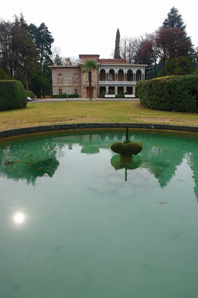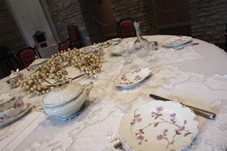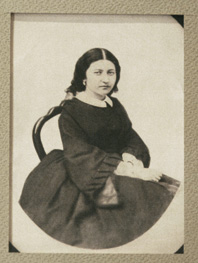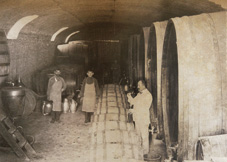
Aleksandre Chavchavadze - Country of Liquid Sun
Thursday, April 2
Aleksandre Chavchavadze - renown poet, one of the founders of Georgian Romanticism, Lieutenant General of the Russian Army, significant figure in political, social and cultural life of nineteenth century Georgia, beloved son of Prince Garsevan Chavchavadze, famous diplomat and public figure of that time.
Aleksandre Chavchavadze's forefathers moved from Khevsureti to Kakheti at the beginning of the eighteenth century and settled in the town of Tsinandali. They grew in number and power in the region and became one of Kakheti's greatest land holding families. Aleksandre's father, Garsevan Chavchavadze who was distinguished by his bright intellect and high moral standards, lived and worked in one of the most complicated periods of changes. At the end of the eighteenth century, King Erekle Il assigned the elder Chavchavadze with the mission of Ambassador Extraordinary and Plenipotentiary of the Kingdom of Kartli-Kakheti to in Russia which was a post he occupied for 18 years. He was believed to be the "first reliable and favourite man" at the emperial court. Maiko Avalishvili, Garsevan Chavchavadze's spouse, was the daughter of Ivane Avalishvili, a Georgian feudal. lord.
In order to remove the power and influence of Iran and to reduce the threat of the Ottoman aggression as a means of achieving peace for his country. Erekle Il entered into an agreement with the Russian state. The signing of this disastrous document, known as the Treaty of Georgievsk, took place at the premises of the Georgievsk Fortress. Signatories were the plenipotentiary representatives of the Kingdom of Kartli-Kakheti, Prince loane Mukhranba- toni (Prince of Mukhrani), and Prince Garsevan Chavchavadze. From the Russian side, it was General Potemkin Later, the conditions of the Treaty were violated and Georgia was declared to be Russian province. Garsevan Chavchavadze, as a staunch ally of Erekle Il and Ambassador Plenipotentiary of Georgia toin Russia, actively participated in these dramatic political events.
Aleksandre Chavchavadze was born in St-Petersburg. The newborn son of Garsevan Chavchavadze was baptised by Emperor Ekaterina Catherine II. From his childhood, Aleksandre spoke his native Georgian, Russian and other European and Persian languages.
At the age of 18, Aleksandre joined Prince Parnaoz in Mtiuleti for the 1804 rebellion for the restoration of the Bagrationi reign. Together with the other participants of the rebellion, Chavchavadze was arrested, tried in Tbilisi and condemned to a five-year exile in Tambov. In 1805, after one year, he was able to return owing to the solicitation of his father, Garsevan, to Emperor Alexander I who overturned the sentence Newly freed, Aleksandre continued his education at a the page college during which time, as with the other periods of his education, his views about literature and poetry were formed.
In 1809, Chavchavadze was awarded the rank of second lieutenant.
In 1811, Aleksandre Chavchavadze was appointed at the position of Ad- jutant of Paulucci, Governor of the Caucasus, and participated in sup- pressing the Kakheti rebellion. He was wounded in battle and nearly died from the injuries sustained. That same year, he married married Salome Orbeliani, a woman distinguished by her beauty and education, who was the daughter of the renown Commander, Ioane Orbeliani.
In the years 1813-1814, Chavchavadze fought against Napoleon and participated in the Battles in Saxony and entered Paris together with the Russian Army.
In 1817, Chavchavadze was awarded the rank of colonel and continued his military service in the Novgorod Dragoon Regiment. Later, he was appointed to the position of Special Tasks Officer under General Yermolov and was awarded the rank of Major General in 1926 and was appointed to the position of Commander of the Kuban Forces. The year 1827 was especially significant for Chavchavadze's military career. He participated in the Russian-Persian War and conquered Tabriz. In this period, he was appointed to the position of Governor of the Yerevan District. In 1828, he participated in the Russian-Ottoman War and took Majazet after a three- week battle. When Paskevich, the Governor General of the Caucasus was informed about this, he is said to have exclaimed with delight "Wonderful, Chavchavadze!"
The conspiracy against the Russian Empire is of special significance within the pages of Aleksandre Chavchavadze's biography. The success of the conspiracy would mean that he would assume a high post in the government of Georgia which is a fact supported by reliable historical sources, He was an active participant in the conspiracy and was directly involved in the development of the plan of action together with Elizbar Eristavi and Zakaria Cholokashvili. At that time, the poem by Grigol Orbeliani, laralis, was passed from one person to the other sheering up the participants of conspiracy and filling them with the hope for its success al- though, in the end, the conspiracy collapsed and its participants were punished very harshly. Naturally, Aleksandre Chavchavadze was punished as well. He was again sent to exile in Tambov and released after four years. As the Empress was his godmother, he was assigned to St-Petersburg.
After his release, Chavchavadze returned to state service and remained faithful to the Russian Empire. In 1841, he was again promoted to the position of lieutenant general.
Aleksandre Chavchavadze's family was the most important cultural centre in Georgia during the first half of the nineteenth century. His large family, himself, his wife Salome and their four children Nino, Ekaterine, David and Sopo lived in Tbilisi and at their Tsinandali estate which was their summer residence. Georgian writers and public figures frequently visited their home where they used to arrange literature and musical evenings theatrical performances and discussions about social issues, The fret grand piano, first piano, the first phaeton, the first collection European wines and, generally, the first European seat in Georgia were all at the estate of Aleksandre Chavchavadze, the founder of Georgian Romanticism. According to Iona Meunargia, the idea of the first permanent Georgian theatre emerged in Chavchavadze's family where they formed a small circle of amateur actors under his leadership. In that period, he translated Pierre Corneille's Le Cid and even prepared a family performance in which Chavchavadze played one of the key characters although the performance was, in the end, not staged for reasons which are not known.
Initially, the Chavchavadzes possessed estates in Tsinandali and Mukuzani. Later, Erekle Il granted Garsevan Chavchavadze the villages of Zegani, Napareuli and Mughanlo, in Kakheti, together with the villagers living there for faithful and devoted service.
Aleksandre further strengthened Garsevan's possessions and turned them into a cultural economy. According to legend, the great Pushkin, whom Aleksandre befriended in Tbilisi in 1829, was fell in love with the beautiful view of the Kakhiskhevi River and Caucasus Mountains as seen from Chavchavadze's estate. The palace in Tsinandali was surrounded by a decorative park with an alley- way lined with evergreens. This dendrological park, with its versatility. well fit with the environment and is evidence of Chavchavadze's aesthetics and fine taste. The park, together with the facilities and nursery, is located on 12 hectares of land, 150 of the 400 species trees are exotic.
Aleksandre Chavchavadze produced fine wines from the grapes of tradition- al Georgian varieties; namely, Rkatsiteli, Saperavi, Mtsvane and Khikhvi. It s known that he yielded over 60.00 roubles from his estates and made great efforts to expand his economy
Unfortunately, a great tragedy occurred for the Chavchavadze family when Shamil's forces invaded Kakheti in the summer of 1854 and ruined Eniseli, Shilda, Gremi and burned the town of Telavi. On 4 July, Shamil's son Kazi Mohammad unexpectedly attacked the Chavchavadze estate, burned the palace in Tsinandali and captured David's wife and children, close relatives who were there and several servants 24 people altogether. At a time of the attack, Shamil's soldiers killed David's youngest child, one-year old Lidia.
In 1855, after extensive negotiations, Shamil exchanged the hostages for his son Jamal ed-Din who had been captured by the Russians. He received 16 captives in all and a large sum of money as ransom. David Chavchavadze pledged Tsinandali, Mukuzani and Napareuli in order to raise the money for Shamil.







